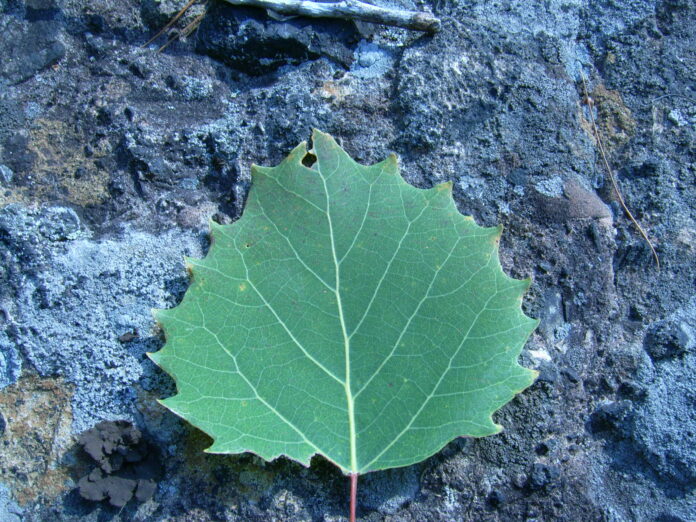
BY HARRY WEEKES

A white leaf drifted down from the tree and settled in the grass. Then another. Then another.
The only problem—this was an aspen tree. I stood inside my house and wondered what I was looking at. The next leaf fell, fluttered left, then right, then exploded into dust. What? When the next leaf fell, it broke into multiple pieces, each fragment accelerating toward the ground. Then it dawned on me, literally and figuratively.
It snowed during the evening (it was the morning of June 8th when this happened). By some quirk of temperature and timing, the snow settled on the leaves, individually—a kind of frost glazing. As the light came up, this covering slipped off of the leaves one at a time. These ghost leaves acted, in many ways, like actual leaves, or like the flower petals dropping from the crabapple trees blown by the wind.
The aspen shook ever so gently, each time shedding a frost leaf. Some managed to make it to the ground intact. Others broke instantly, falling as a thin spray of ice. Each was something unexpected, something I had never seen before. In total, I spent maybe 15 minutes watching this unfold. I was the only one awake (except for the cat, who just stared at me), and I am confident I cannot accurately capture what this moment felt like.
The little and powerful lesson that came away was this: I don’t have to describe it. I can be unsure and it is OK, even wonderful. With coronavirus, I have felt so much the opposite—wanting to know, wanting to be in control, wanting things to be certain. Even as I have longed for these, I have forgotten the opposite is powerful, too. That not knowing can be a good thing, that appreciating something for how it is in the moment is important and carries weight, that it is OK just to be.
Coronavirus, very quickly, highlighted something that I took for granted—the future is an assumption. What happens tomorrow has always been ambiguous. Any certainty comes from the fact that, mostly, the environment stays the same. Yes, seasons change, but there is a regularity and rhythm to the world. There is predictability. Predictability breeds habits, and in those habits there is comfort.
As these ghost leaves fell, I realized something else; there is wonder and magic in the unpredictable and the unexpected and the inexplicable. It is OK not to know.
I do not know, immediately, what gifts will come from coronavirus, what opportunities will emerge from this time. I have heard the phrase “silver linings” more than once in the past three months—related to time spent with family, in association with more time outside, about a chance we have to recognize that certain things are broken and now they can be fixed.
As we step into these big tasks ahead, it is nice to be reminded of the small beauty that awaits us in the world if we take time to stop and stare for a while.
Harry Weekes is the founder and head of school at The Sage School in Hailey. This is his 48th year in the Wood River Valley, where he lives with Hilary and two of their three baby adults—Penelope and Simon. The other member of the flock, Georgia, is currently fledging at Davidson College in North Carolina.


